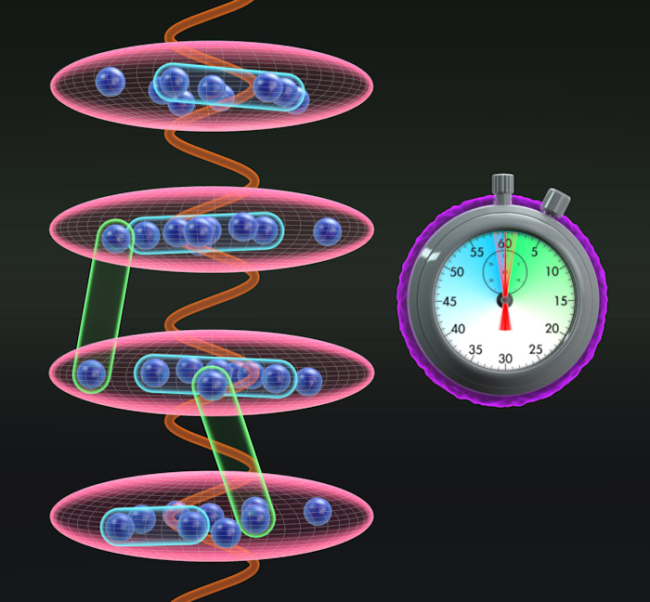Hamiltonian engineering of spin-orbit coupled fermions in a Wannier-Stark optical lattice clock
| Author | |
|---|---|
| Abstract |
Engineering a Hamiltonian system with tunable interactions provides opportunities to optimize performance for quantum sensing and explore emerging phenomena of many-body systems. An optical lattice clock based on partially delocalized Wannier-Stark states in a gravity-tilted shallow lattice supports superior quantum coherence and adjustable interactions via spin-orbit coupling, thus presenting a powerful spin model realization. The relative strength of the on-site and off-site interactions can be tuned to achieve a zero density shift at a `magic' lattice depth. |
| Year of Publication |
2022
|
| Date Published |
2022-11
|
| Journal Title |
Science Advances
|
| Volume |
8
|
| Issue |
41
|
| Start Page or Article ID |
eadc9242
|
| DOI | |
| URL | |
| Download citation | |
| JILA PI | |
| Related JILA Highlights | |
| Associated Institutes | |
Journal Article
|
|
| JILA Topics | |
| Publication Status | |
| Publication Image |

|


 The Physics Frontiers Centers (PFC) program supports university-based centers and institutes where the collective efforts of a larger group of individuals can enable transformational advances in the most promising research areas. The program is designed to foster major breakthroughs at the intellectual frontiers of physics by providing needed resources such as combinations of talents, skills, disciplines, and/or specialized infrastructure, not usually available to individual investigators or small groups, in an environment in which the collective efforts of the larger group can be shown to be seminal to promoting significant progress in the science and the education of students. PFCs also include creative, substantive activities aimed at enhancing education, broadening participation of traditionally underrepresented groups, and outreach to the scientific community and general public.
The Physics Frontiers Centers (PFC) program supports university-based centers and institutes where the collective efforts of a larger group of individuals can enable transformational advances in the most promising research areas. The program is designed to foster major breakthroughs at the intellectual frontiers of physics by providing needed resources such as combinations of talents, skills, disciplines, and/or specialized infrastructure, not usually available to individual investigators or small groups, in an environment in which the collective efforts of the larger group can be shown to be seminal to promoting significant progress in the science and the education of students. PFCs also include creative, substantive activities aimed at enhancing education, broadening participation of traditionally underrepresented groups, and outreach to the scientific community and general public.